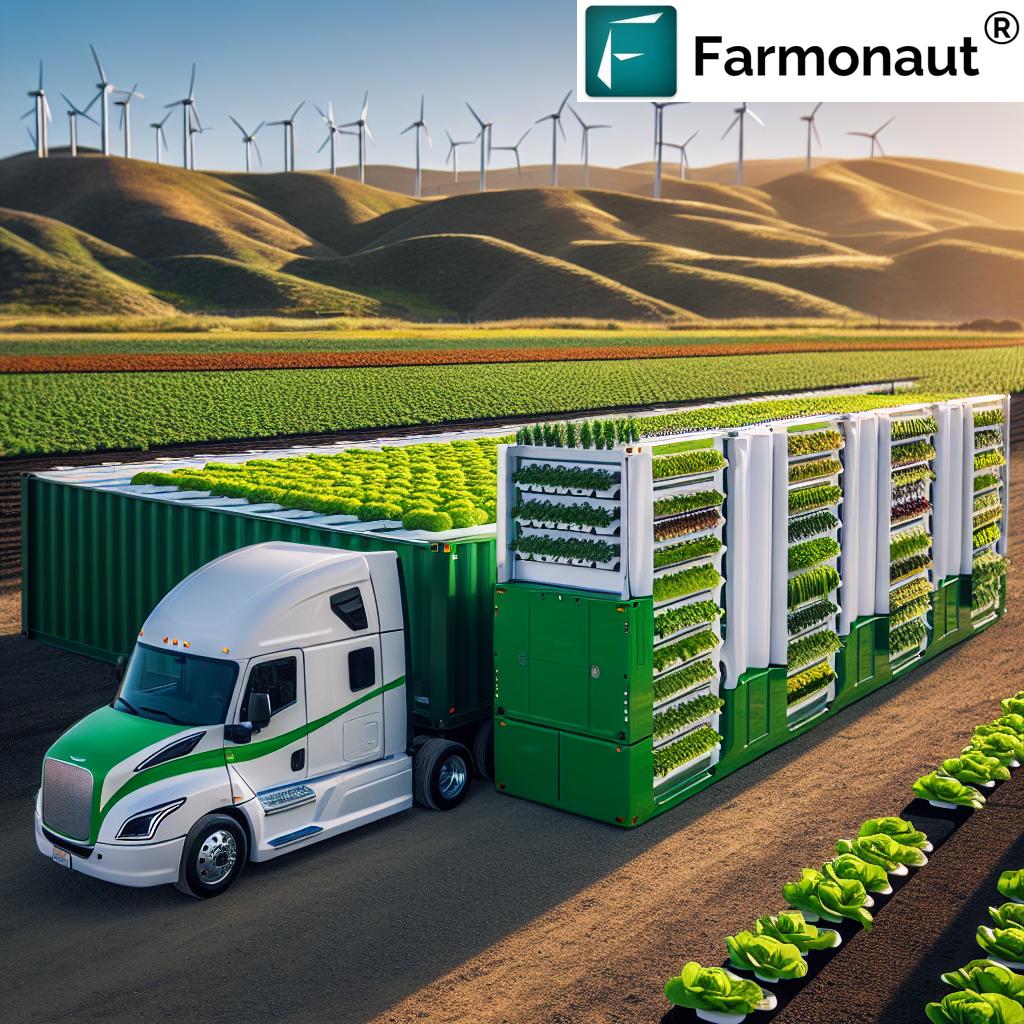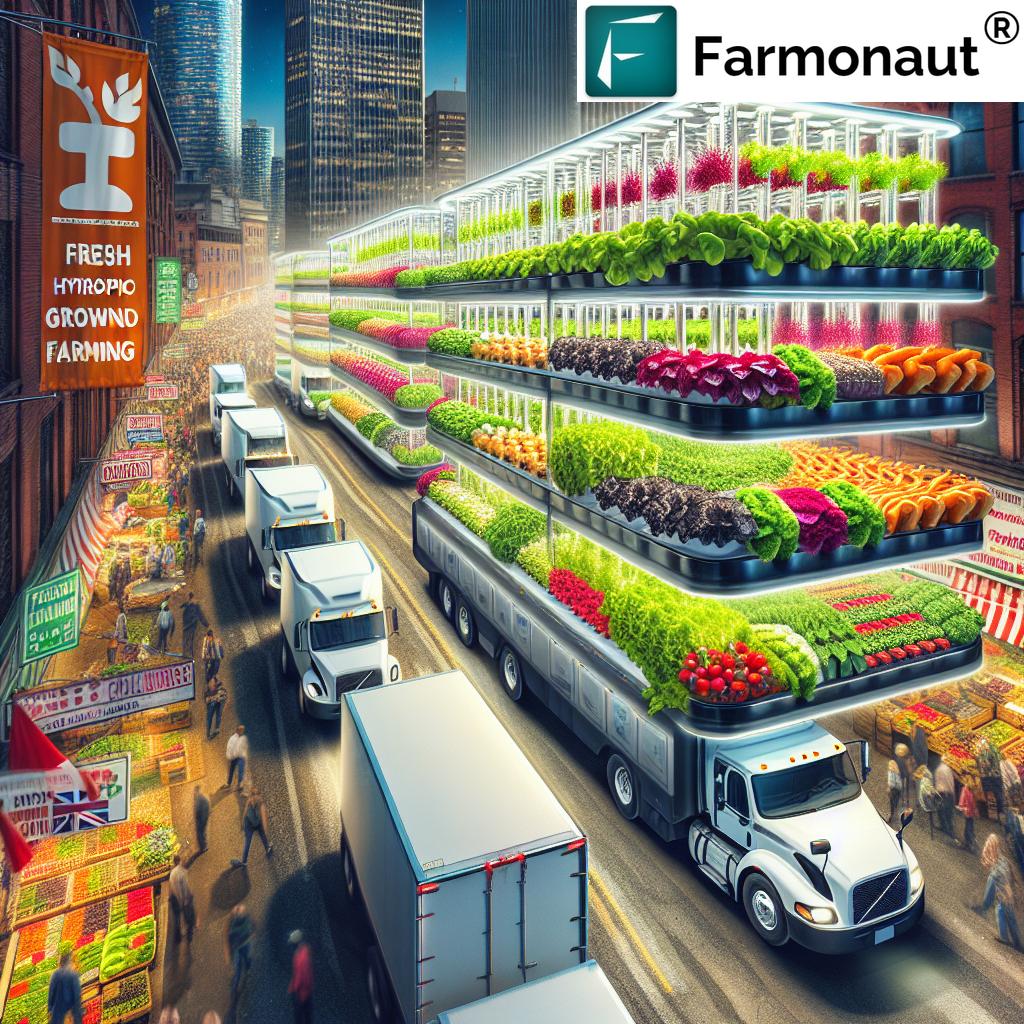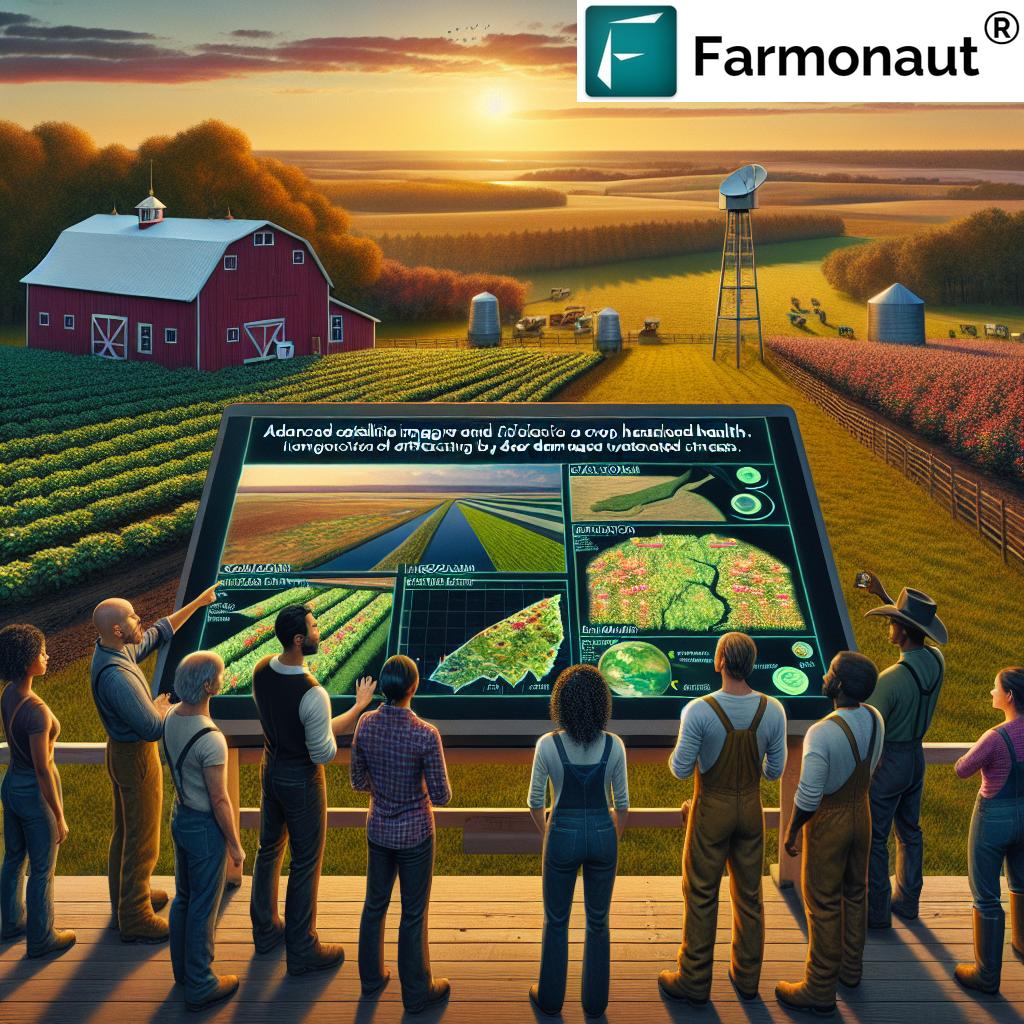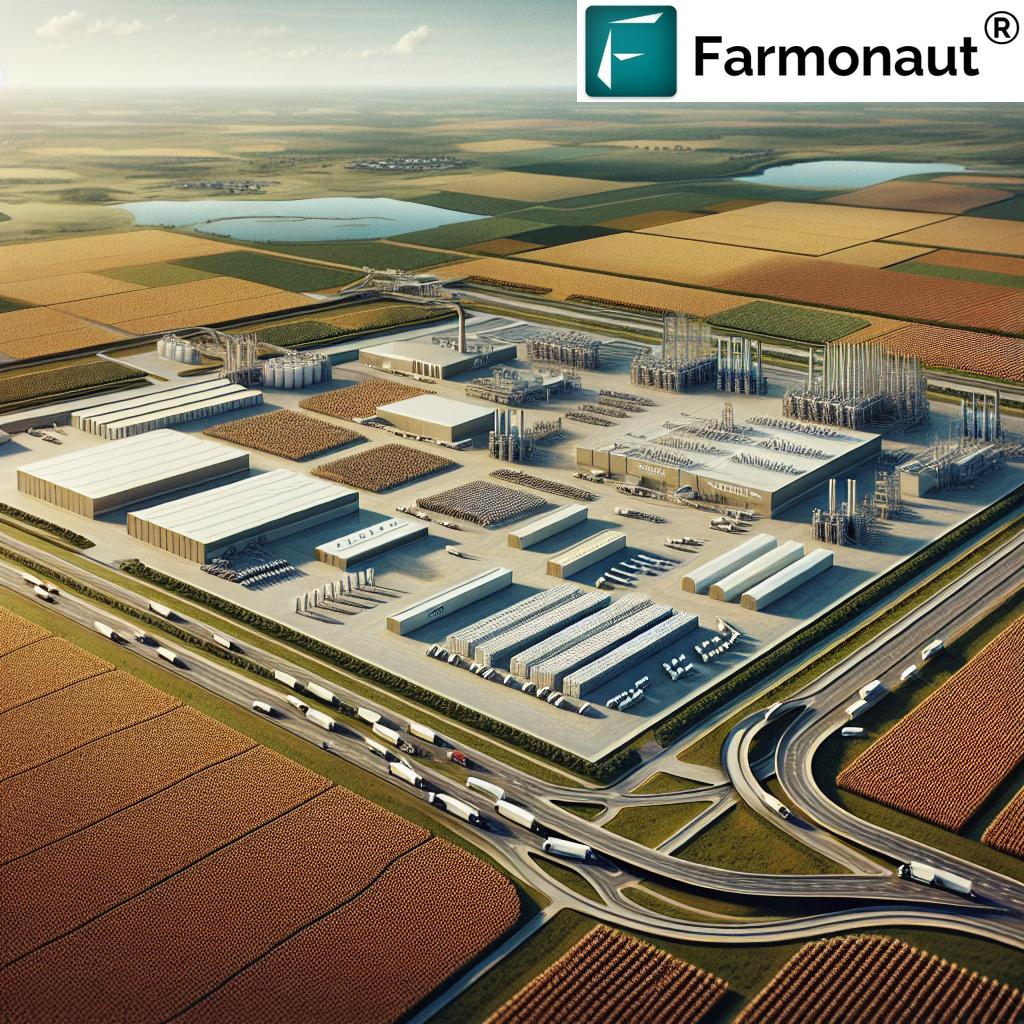5 EV Trucks Launch in California to Boost Mobile Vertical Farming
“5 new EV trucks launched in California are set to support over 200 mobile vertical farming units statewide.”
Table of Contents
- Introduction: Electric Vehicle Trucks & the Future of Mobile Vertical Farming
- Nature’s Miracle & ZO Motors: Technology Meets Sustainability
- How EV Trucks Empower Mobile Vertical Farming in California
- Inside the Mobile Vertical Farm: Hydroponic Farming Technology
- Comparison Table: EV Trucks for Mobile Vertical Farming
- Sustainable Agriculture Technology: Hydroponic, Controlled Environment, and Green Mobility
- Farmonaut’s Role in Agricultural Innovation
- Technology and Business Benefits for Growers and Agribusinesses
- Regulatory Support: Rebates, USDA Subsidy, and Financing
- The Road Ahead: The Future of Mobile Vertical Farming in California
- Frequently Asked Questions
- Summary: A New Era for Green Food Production
- Farmonaut Subscription Plans
Introduction: Electric Vehicle Trucks & the Future of Mobile Vertical Farming
The agriculture industry is undergoing a revolution as technology and sustainability merge to address the world’s food supply challenges. In a dramatic step forward, five state-of-the-art EV trucks have been acquired for mobile vertical farming purposes in California, marking a new era for sustainable, reliable, and fresh produce delivery. Under the innovation leadership of Nature’s Miracle Holding Inc. and advanced vehicles from ZO Motors North America, this initiative promises to seamlessly integrate electric vehicle trucks for agriculture with cutting-edge hydroponic farming technology and environmentally friendly farming solutions.
As the global demand for safe and fresh food rises, urban congestion increases, and natural resources become scarcer, the solution lies in harnessing leading-edge urban farming solutions that can operate efficiently within cities and suburbs. The recent purchase of five specialized EV trucks sets the stage for a larger movement: deploying up to 100 mobile vertical farms across southern California by the end of 2025. Each truck, transformed into a self-contained, mobile farm, promises to redefine how we grow and distribute food throughout urban centers.
The focus of this release is to unveil how mobile vertical farming, powered by hydroponic systems installed within eco-friendly EVs, is revolutionizing fresh micro greens delivery, resource efficiency, and the overall future of urban agriculture.
Nature’s Miracle & ZO Motors: Technology Meets Sustainability
On April 28, 2025, in Ontario, CA, Nature’s Miracle Holding Inc. (OTCQB: NMHI)—a leader in vertical farming technology—publicly announced the purchase of five EV trucks from ZO Motors North America. Each mobile electric vehicle, boasting an 11,000 pound payload and a storage box akin to a 20-foot container, will be upfitted with advanced hydroponic equipment. Through strategically engineered retrofitting, these vehicles will become mobile vertical farms, each capable of growing approximately 3,000 pounds of fresh micro-greens and herbs for direct, hyperlocal delivery.
The agreement leverages California’s robust electric vehicle rebate program, ensuring advanced green transportation for farms is both operationally feasible and financially practical for large-scale rollouts. Over 2025, up to 100 such EV trucks are expected to be deployed, drastically expanding capacity within the southern California market.
Nature’s Miracle: What Sets Their Technology Apart?
- Strong focus on controlled environment agriculture (CEA)—ensuring stable, optimal indoor growing conditions.
- Deployment of advanced hydroponic farming technology—allowing for soil-less, water-efficient plant growth.
- Commitment to scalable, environmentally friendly farming solutions—reducing resource consumption and emissions.
How EV Trucks Empower Mobile Vertical Farming in California
Modern urban agriculture faces crucial bottlenecks: land scarcity, water shortages, and lengthy supply chains. Mobile vertical farming addresses these issues by literally putting the farm on wheels, allowing fresh produce to be grown and harvested inside vehicles and delivered directly to consumers and businesses.
Key Features of the Mobile Vertical Farm Trucks:
- 11,000-pound payload: Each unit maximizes its internal growing space and delivers significant weekly produce output.
- 20-foot container-sized box: Provides sufficient volume to install hydroponic growing beds and climate controls.
- Fully electric operation: Reduces greenhouse gas emissions and operational noise.
- Hydroponic cultivation: Up to 90% less water usage compared to conventional soil agriculture.
- Self-contained mobility: Farms travel directly to neighborhood hubs, restaurants, and local markets.
- Fresh micro-green and herb products: Each truck can support the annual salad needs of ~40 people, replenishing communities’ fresh food supply quickly and locally.
By utilizing EV trucks for their chassis and powertrains, mobile vertical farms run on electricity, charge via sustainable grids, and benefit from California’s extensive rebates and incentive programs.
“Hydroponic mobile farms powered by green EVs can deliver fresh produce up to 30% faster than traditional methods.”
Inside the Mobile Vertical Farm: Hydroponic Farming Technology
At the core of each mobile vertical farm is an advanced hydroponic system, engineered for mobility and maximum efficiency. Hydroponics enables crops—especially micro greens and herbs—to thrive in stacked layers, using nutrient-rich water rather than soil. This revolutionary approach delivers multiple benefits:
- Water savings: Uses up to 90% less water than traditional soil farming (environmentally friendly farming solutions).
- Rapid, predictable harvests: Controlled systems allow year-round production, regardless of outdoor conditions.
- Minimal pesticide use: Closed environments reduce exposure to pests.
- Space efficiency: Vertical stacking maximizes yield per cubic foot compared to conventional flat-bed farming.
The Hydroponic Growing Cycle Within a Truck
- Setup: Trucks are fitted with insulated hydroponic racks, LED lighting, temperature, and humidity control systems.
- Seeding: Micro greens and herb seeds are germinated in trays with water and nutrients.
- Growth: Plants mature rapidly under optimal light and climate, with precise watering systems.
- Harvest: Mature produce is cut and packed inside the vehicle, ready for fast distribution.
This process offers a safe, scalable, and robust solution for commercial hydroponic systems in urban California—serving the evolving needs of both consumers and businesses.
Comparison Table: EV Trucks for Mobile Vertical Farming
To make informed decisions about electric vehicle trucks for agriculture, growers and operators must compare key technical specifications. Here is a hypothetical comparison (using estimated values based on industry standards and the details provided in the press release) across the five launched EV trucks supporting mobile vertical farming in California:
| Truck Model | Estimated Range (miles) | Payload Capacity (tons) | Hydroponic Equipment Supported | Energy Efficiency (kWh/mile) | Projected Produce Output (kg/week) |
|---|---|---|---|---|---|
| EV Mobile Farm One | 200 | 5 | Multi-layer micro green racks, LED, full HVAC | 1.4 | 260 |
| EV Mobile Farm Two | 220 | 5.5 | Hydroponic columns, automated irrigation | 1.2 | 275 |
| EV Mobile Farm Three | 180 | 5 | Vertical trays, UV-C sanitation | 1.5 | 260 |
| EV Mobile Farm Four | 240 | 6 | Full hydroponic system, CO2 control | 1.1 | 290 |
| EV Mobile Farm Five | 210 | 5.2 | Automated seeding & harvest tech | 1.3 | 270 |
These parameters demonstrate how commercial hydroponic systems and green mobile vertical farming operations can select vehicles aligned to their mission—whether optimizing for range, payload, or automation.
Sustainable Agriculture Technology: Hydroponic, Controlled Environment, and Green Mobility
The deployment of mobile vertical farm EV trucks is a model of sustainable agriculture technology and environmentally friendly farming solutions. Here’s how:
Environmental Benefits
- Carbon Reduction: All-electric operation brings zero tailpipe emissions, supporting city sustainability targets.
- Resource Efficiency: Hydroponic growing uses less water, fertilizer, and land—protecting natural ecosystems.
- Waste Minimization: Direct-to-market vehicle supply chains reduce food spoilage and packaging waste.
Urban Integration & Community Impact
- Hyperlocal Food Supply: Fresh micro greens and herbs are harvested daily, arriving at doorsteps within the Los Angeles, CA market the same day.
- Access & Equity: By mobilizing vertical farming, healthy produce reaches underserved neighborhoods and food deserts more efficiently.
- New Economic Opportunities: Creation of skilled jobs in mobile farm operations, maintenance, and produce logistics.
Track and reduce your carbon footprint with Farmonaut’s carbon footprinting tools. Businesses and growers can monitor and manage their greenhouse gas emissions for compliance and environmental stewardship, leveraging actionable insights for lower-impact farming operations.
Farmonaut’s Role in Agricultural Innovation
Amid these sweeping changes in the agriculture industry, Farmonaut stands as a beacon for affordable, accessible, and advanced farm management. We continuously support growers and agribusinesses through a suite of technology-driven solutions for modern farming operations.
- Satellite-Based Crop Health Monitoring: Our platform delivers real-time crop and soil analytics with NDVI, moisture indices, and more, enabling precise decision-making for every farm—season after season.
- AI-Based Advisory: Jeevn AI tailors expert advice, enhancing operational efficiency, sustainable output, and risk management for both individual and commercial growers.
- Blockchain Product Traceability: Through traceability solutions, we provide transparency and security on a crop’s journey “from seed to sale,” building trust with customers and partners. Learn how Farmonaut’s product traceability builds transparency in your supply chains.
- Fleet & Resource Management: Efficiently manage EV trucks, farm fleets, and resource distribution using Farmonaut’s fleet management tools. Our solutions help reduce fleet costs, optimize routes, and improve safety for agriculture logistics.
- Carbon Footprinting & Sustainability: See our earlier section on sustainability—tracking emissions and making actionable environmental improvements is easier than ever with Farmonaut.
- API Access for Integration: Developers and business innovators can incorporate real-time satellite and weather data into third-party applications. Access our API here or view the Developer Documentation for full integration options.
Technology and Business Benefits for Growers and Agribusinesses
The convergence of EV trucks, hydroponic farming, and vertical agriculture means more than just greener produce. It is also a business game-changer:
- Reduced Operational Costs: With lower maintenance and fueling costs, electric vehicles free up resources for growing and delivering higher-quality crops.
- Shorter Supply Chains: Produce can move from “growth” to “customer” the same day, reducing the need for centralized storage and cold chain logistics.
- Dynamic Farm Management: Thanks to mobile platforms and remote monitoring, operators can deliver to high-demand neighborhoods on short notice and re-route as needed.
- Certified Quality & Trust: Blockchain-based tracking and analytics ensure food safety and organic standards.
Farmers and agribusinesses can access crop loan and insurance verification with Farmonaut. Using up-to-date satellite and analytical data, our services make it easier to qualify for agricultural loans and reduce risks for both growers and financial institutions.
Regulatory Support: Rebates, USDA Subsidy, and Financing for Mobile Vertical Farming EVs
Recognizing the future importance of green transportation for farms and sustainable agriculture technology, both California state and federal programs provide strong incentives for the adoption of mobile vertical farming vehicles:
- California Electric Rebate Program: Offers financial rebates for electric vehicle purchase and fleet expansion, lowering barriers to entry for urban growers and commercial operators.
- USDA Subsidy and Financing: Qualifying mobile farm projects can receive federal support for capital investment in hydroponics, equipment, and commercial EV trucks.
- Compliance with Evolving Laws & Regulations: The mobility of these farms aligns with current and future urban planning, waste reduction, and local food sourcing regulations in CA and across North America.
By utilizing every available program and incentive, innovators in the agricultural market can build resilient, responsive food supply chains for cities of tomorrow.
For large-scale farm managers and agribusinesses, Farmonaut’s Agro-Admin App delivers streamlined large scale farm management. Easily monitor, analyze, and manage vast growing operations remotely, incorporating real-time satellite insights and advanced analytics across fleets and facilities.
The Road Ahead: The Future of Mobile Vertical Farming in California
Southern California is on the cusp of a commercial farming revolution—one where every parking lot, commercial center, or even rooftop could host a fully mobile vertical farm. By the end of 2025, as many as 100 EV-powered units could be delivering thousands of pounds of hyperlocal, hydroponically grown, fresh produce every day.
- Urban Food Security: Deployment across Los Angeles and beyond promises food resiliency in a region susceptible to drought and supply chain challenges.
- Economic & Workforce Development: New jobs and entrepreneurial opportunities emerge for technicians, logistics managers, and crop scientists focused on environmentally friendly agri-business models.
- Replicable Global Model: California’s leadership is a template for efficient, scalable urban agriculture worldwide.
Frequently Asked Questions
What is mobile vertical farming?
Mobile vertical farming involves growing crops in vertically stacked layers within portable, climate-controlled vehicles—most notably, electric trucks equipped with hydroponic systems. This allows for on-demand, hyperlocal food production and flexible supply to urban centers.
How are EV trucks integrated into agricultural operations?
EV trucks provide the mobility, power, and environmental performance necessary for modern urban agriculture. Outfitted with hydroponic equipment, they function as mobile farms, delivering fresh produce while minimizing emissions and operational costs.
What crops are typically grown in mobile vertical farms?
Micro greens, leafy greens, herbs, and other high-value, rapid-turnover crops thrive best in hydroponic, controlled environment agriculture systems within these mobile farms.
What are the environmental benefits of this approach?
This approach drastically reduces water usage, fertilizer runoff, and food miles, while eliminating tailpipe emissions through all-electric operations. The vertical design also maximizes space utilization and minimizes agricultural land expansion.
How does Farmonaut enhance farm operations in this context?
Farmonaut’s platform delivers real-time crop monitoring, satellite analytics, fleet/resource management, and blockchain-based traceability, helping growers optimize production, track environmental impact, and ensure supply chain transparency for all types of agriculture—static or mobile.
Can small and medium-sized businesses benefit from this technology?
Yes. Smallholders, MSMEs, and commercial growers can all leverage mobile vertical farming with EV trucks due to lower barriers to entry, state and federal incentives, and the modular, scalable design of modern systems. Farmonaut’s affordable, subscription-based management tools further streamline adoption and growth.
Summary: A New Era for Green Food Production
The launch of five EV trucks for mobile vertical farming in California heralds a transformative shift in sustainable agriculture and urban food delivery. Through innovative integrations of hydroponic farming technology, environmentally friendly vehicles, and advanced data-driven tools, today’s growers in CA and beyond can efficiently supply safe, nutritious, and local produce to meet the demands of tomorrow’s cities.
- The rollout is supported by state and federal rebate and subsidy programs, making advanced green food supply chains both practical and economical.
- Our digital services and technology—delivered via web, Android, iOS, and API—empower the full spectrum of agricultural professionals, from individual field operators to large commercial enterprises.
- With blockchain-based traceability, satellite monitoring, and resource management, Farmonaut stands committed to supporting the next generation of urban, sustainable, and resilient agriculture for North America and beyond.
Farmonaut Subscription Plans
Explore how affordable and flexible our precision agriculture solutions can be for monitoring crop health, managing resources, and scaling your operations—whether your farm is fixed or mobile.
Start with Farmonaut today.
















